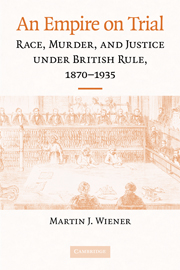Book contents
- Frontmatter
- Contents
- Preface
- Acknowledgments
- AN EMPIRE ON TRIAL
- Introduction
- 1 On the High Seas
- 2 Queensland, 1869–1889
- 3 Fiji, 1875–1885
- 4 Trinidad and the Bahamas, 1886–1897
- 5 India: The Setting
- 6 India: In the Legal Arena, 1889–1922
- 7 Kenya, 1905–1934
- 8 British Honduras, 1934
- Conclusion
- Bibliography
- Index
6 - India: In the Legal Arena, 1889–1922
Published online by Cambridge University Press: 05 June 2012
- Frontmatter
- Contents
- Preface
- Acknowledgments
- AN EMPIRE ON TRIAL
- Introduction
- 1 On the High Seas
- 2 Queensland, 1869–1889
- 3 Fiji, 1875–1885
- 4 Trinidad and the Bahamas, 1886–1897
- 5 India: The Setting
- 6 India: In the Legal Arena, 1889–1922
- 7 Kenya, 1905–1934
- 8 British Honduras, 1934
- Conclusion
- Bibliography
- Index
Summary
Every British magistrate in India is in a false position when he has to try a case in which European and native interests clash. In theory he is administering an impartial system of justice; in practice he is part of a huge machine which exists to protect British interests, and he has often got to choose between sacrificing his integrity and damaging his career. … Nevertheless, owing to the exceptionally high traditions of the Indian Civil Service, the law in India is administered far more fairly than might be expected.
George Orwell, 1938The arena of criminal justice in India was structured by a Code first drafted in the 1840s by Thomas Macaulay, though only enacted (with revisions) in 1860. The Indian Penal Code was shaped on the model of England's criminal law, cleansed of many technicalities and obscurities that had accumulated over the centuries, and with additions and deletions to accommodate Indian conditions, like specific provision for the greater incidence of infanticide and “dacoity” (robbery by groups). As extended and modified by Fitzjames Stephen's 1872 Criminal Procedure and Evidence Acts, the Code contained provisions that both favored and restrained state power. On the one hand, it facilitated prosecution by doing away with some burdensome procedural requirements inherited from earlier English times. It also responded to the scarcity of British officials by leaving a larger role for (Indian) police, who were under less effective supervision than their counterparts in England.
- Type
- Chapter
- Information
- An Empire on TrialRace, Murder, and Justice under British Rule, 1870–1935, pp. 156 - 192Publisher: Cambridge University PressPrint publication year: 2008



